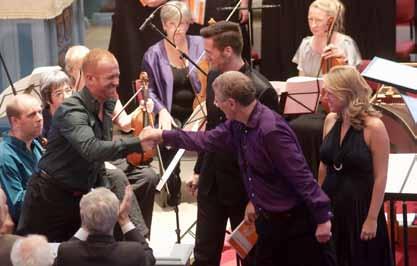Ludus Baroque Richard Neville-Towle
Sophie Bevan soprano

Ed
Lyon tenor
William Berger bass

Ludus Baroque Richard Neville-Towle
Sophie Bevan soprano

Ed
Lyon tenor
William Berger bass
(hwv 75)
George Frideric Handel (1685 - 1759)
Ludus Baroque
Richard Neville-Towle conductor
Sophie Bevan soprano – Ed Lyon tenor – William Berger bass
1 Ouverture [5:38]
2 Recitative (tenor) ‘Twas at the royal feast [0:50]
3 Air (soprano / tenor) and Chorus Happy, happy, happy pair! [4:34]
4 Recitative (tenor) Timotheus, plac’d on high [0:54]
5 Recitative (soprano) The song began from Jove [1:13]
6 Chorus The list’ning crowd admire the lofty sound [2:08]
7 Air (soprano) With ravish’d ears the monarch hears [3:15]
8 Recitative (tenor) The praise of Bacchus [0:34]
9 Air (bass) and Chorus Bacchus, ever fair and young [4:32]
10 Recitative (tenor) Sooth’d with the sound, the king grew vain [0:42]
11 Recitative (soprano) He chose a mournful Muse [1:14]
12 Air (soprano) He sung Darius, great and good [3:00]
13 Recitative (soprano) With downcast looks the joyless victor sate [0:47]
14 Chorus Behold Darius great and good [2:20]
15 Recitative (tenor) The mighty master smil’d to see [0:26]
16 Arioso (soprano) Softly sweet in Lydian measures [3:01]
17 Air (tenor) War, he sung, is toil and trouble [4:45]
18 Chorus The many rend the skies with loud applause [3:34]
19 Air (soprano) The prince, unable to conceal his pain [9:21]
Ludus Baroque is grateful to its supporters who have made this recording possible:
Arts and Business Scotland
Lord and Lady Balfour of Burleigh
The Binks Trust
Brooks Macdonald Asset Management
Dunard Fund
Richard and Catherine Burns
The Terpsichore Trust
1 Recitative (tenor) and Chorus Now strike the golden Lyre again [3:02]
2 Air (bass) Revenge, Timotheus cries [7:43]
3 Recitative (tenor) Give the vengeance due [1:12]
4 Air (tenor) The princes applaud with a furious joy [2:17]
5 Air (soprano) and Chorus Thais led the way [4:59]
6 Recitative (tenor) Thus, long ago [0:43]
7 Grand Chorus At last divine Cecilia came [2:58]
8 Recitative (tenor / bass) Let old Timotheus yield the prize [0:22]
9 Chorus Let old Timotheus yield the prize [3:33]
10 Chorus Your voices tune, and raise them high [2:49]
playing time
Recorded on 26-29 August 2010 in Canongate Kirk, Edinburgh
Producer: Paul Baxter
Engineer: Ben Seal
24-bit digital editing: Adam Binks
24-bit digital mastering: Paul Baxter
Photography © Stuart Barrett
Cover image: www.luciedebelkova.com
Design: John Christ
Booklet editor: Andrew Caskie
Delphian Records Ltd – Edinburgh – UK www.delphianrecords.co.uk
Recorded in Canongate Kirk, Edinburgh by kind permission of the Minister and Kirk Session.
Dryden, Handel and the ‘Power of Musick’: Alexander’s Feast
in 1584 her name was adopted in honour by Rome’s newly founded Academy of Music.
The third-century martyr St Cecilia became regarded as the patron saint of music because of a misreading of the heavily fictionalized account of her Acts, which dated originally from before 500 AD. The legend tells us that the young and virtuous Roman girl Cecilia was given in marriage against her will to the pagan Valerian. On their wedding day, while organs played for the festivities, she sang a silent prayer in her heart imploring God to keep her unsullied by carnal sin. An angel came to protect her, and Cecilia told Valerian about her divine guardian, but promised that her husband would be rewarded by divine grace if he respected her virginity. Valerian, understandably, insisted that he would only be convinced if he could see the angel himself; Cecilia persuaded him to be baptised and receive instruction from Pope Urban, assuring him that he would see the angel if he obeyed. Her husband agreed and converted to Christianity; upon his return home from visiting the Pope he saw the angel, who then bestowed the couple with floral crowns. As with most early Roman Catholic martyrs, Cecilia met a grisly death, but the legend’s mention of organs and the song of her heart led eventually to the saint being portrayed by Renaissance artists playing an organ (or sometimes a lute), and
In 1683 a group of London musicians and amateur enthusiasts initiated the Musical Society, an organisation devoted to an annual celebration of St Cecilia’s Day (22 November) that consisted of a banquet during which an ode would be performed by singers from St Paul’s Cathedral, Westminster Abbey, the Chapel Royal and London theatres, and accompanied by players from theatre orchestras and the King’s Band of Music. The Musical Society commissioned Henry Purcell’s ode Welcome to all the pleasures for their first Cecilian commemoration (1683), and from 1693 their celebratory banquet was preceded by a church service at St Bride’s, Fleet Street, which included a sermon in defence of church music (an aspect of British cultural life that was by no means assured against disapproving Puritanical onslaughts throughout the seventeenth century).
In 1687 the festival stewards commissioned an ode from the Poet Laureate John Dryden. Using literary playfulness, loose artistic licence, and witty allusions to different kinds of musical instruments, Dryden’s Song for St Cecilia’s Day (set to music by Giovanni Battista Draghi) adapted the medieval theological idea that the Divine Creator had used musical powers to construct the
universe from unorganised chaos (‘From harmony, heav’nly harmony, this universal frame began’); the gifted poet also connected the legend of Cecilia’s association with the organ to the story of her guardian angel, suggesting that the beauty of Cecilia’s organ-playing drew the angel down to earth, whereas the songs of the heathen Orpheus could only tame wild beasts and inanimate nature. However, the subsequent political turmoil of 1688–9 had a drastic impact on Dryden’s career: the Cambridgeeducated intellectual had flourished after the Restoration, and converted to Roman Catholicism after the succession of James II in 1685; the poet’s enemies condemned his conversion as shameless opportunism, but after the involuntary abdication of James II and the so-called ‘Glorious Revolution’ of 1688/9 Dryden’s steadfast integrity was proved by his refusal to recant or retire quietly from public life. Stripped of his court post, he was forced to earn his living from the theatre and scholarly publications such as translations of ancient classical authors Virgil, Plutarch and Ovid.
Nevertheless, the stewards of the Musical Society entertained no doubt whatsoever that Dryden was the foremost literary Englishman of their age. On 3 September 1697 the poet wrote to his sons: ‘I am writeing a Song for St Cecilia’s feast, who you know is the
Patroness of Musique. This is troublesome, & no way beneficiall: but I coud not deny the Stewards of the feast, who came in a body to me, to desire that kindness’. According to one contemporary, Dryden ‘was almost a fortnight in composing and correcting’ the new poem Alexander’s Feast; or, the Power of Musick , for which he was reputedly paid £40. A contradictory later anecdote claims that Lord Bolingbroke visited Dryden one morning in autumn 1697, and ‘found him in an unusual agitation of spirits, even to a trembling. On enquiring the cause, “I have been up all night, replied the old bard; my musical friends made me promise to write them an ode for their feast of St Cæcilia: I have been so struck with the subject which occurred to me, that I could not leave it till I had completed it; here it is, finished at one sitting”.’ The paradoxical anecdotes suggest that maybe Dryden composed the first draft of the entire ode in one inspired sitting, but then spent the next fortnight refining his ideas.
Rather than regurgitate the style of his 1687 ode, Dryden’s new and longer ode explored music’s ability to change and motivate moods, exemplified by the mythical story of Alexander the Great’s susceptibility to the musical exploitations of his court musician Timotheus. This concept could have been influenced by Jeremy Collier’s essay
Of Musick , which had been published in London earlier in 1697:
Timotheus , a Grecian, was so great a Master, that he could make a Man storm and swagger like a Tempest. And then, by altering the Notes , and the Time, he would take him down again, and sweeten his Humour in a trice. One time, when Alexander [the Great] was at dinner, this Man play’d him a Phyrgian Air: The Prince immediately rises, snatches up his Lance, and puts himself in a Posture of Fighting. And the Retreat was no sooner Sounded by the Change of Harmony, but his Arms were Grounded, and his Fire extinct, and he sat down as orderly as if he had come from one of Aristotle’s Lectures.
Dryden cleverly combined the legend of Timotheus’s manipulative use of affective musical modes with several other stories about Alexander the Great’s conceited grandeur and flaws. The poet’s description of the Greek conqueror as a ‘God-like hero’ infers that his delusion of divine parentage is ridiculous (because he is only ‘God-like’, and not actually a God), and, notwithstanding the charm of the story and the entertaining character of the verses, Dryden voices an ironic cynicism regarding the ‘hero’ Alexander. A significant part of the poem dwells upon Alexander’s sorrow over the ignominious death of his enemy Darius III, the King of Persia, pursued across his own
empire by Greek invaders and eventually murdered by his own disillusioned men, but this is countermanded with Alexander’s thirst for the ghosts of Greek soldiers to be avenged. Moreover, Dryden imaginatively placed the events portrayed in the ode at the victorious Greek’s wildly drunken banquet at Persepolis in 331 BC. The beautiful ceremonial capital of Persia had surrendered to Alexander without resistance, but, influenced by too much alcohol and beguiled by his Athenian courtesan Thais (who according to Dryden is only like a ‘blooming Eastern bride’), the irrational conqueror razed the guiltless city to the ground. According to Plutarch, Thais had declared that ‘it would please her … if while the King look’d on, she might in sport, with her own Hands, set fire to … [the] Court’, and Alexander, ‘perswaded to be of the Party, started from his Seat, and with a Chaplet of Flowers on his Head, and a lighted Torch in his Hand, led them the way’.
Dryden’s satirical scepticism of Alexander the Great was influenced by classical historians, who had recorded that the the handsome Greek emperor could be astonishingly courageous, resolute, a genius of military strategy, and extraordinarily magnanimous towards his defeated foes, but also that his judgments and actions could unpredictably lapse into frailty, impetuousness, stubbornness, conceit
and foolishness, and his unbridled drunkenness led to acts of horrific barbarity. Dryden would have regarded the unwarranted firing of Persepolis as one of the most evil atrocities of classical history; his translation of Virgil’s Aeneid had deplored the catastrophic sacking of Troy, and in Alexander’s Feast the poet observes that ‘Thais led the way … and, like another Helen, she fir’d another Troy’.
The traditional legends of Timotheus showed him restoring the pliable Alexander to peacefulness, but Dryden changed this so that the enchantments of the musician culminate in an incitement to destroy a great treasure of the ancient world. Albeit designed by Dryden to be a superficially charming presentation of different musical moods ideal for an imaginative composer to set to music, the ode subtly insinuates that a deplorable act of philistinism is carried out by a delusional monarch, influenced by the whim of an immoral prostitute, and the deviousness of a pagan (i.e. un-Christian) musician who conspicuously fails to use his powers to achieve goodness. Dryden concludes his literary masterpiece by comparing the profane evil of Timotheus (who could merely ‘swell the soul to rage, or kindle soft desire’) to the divine goodness of St Cecilia (who might not have offered so much entertaining worldly variety for her audience, but whose pure motives succeeded in drawing an
angel down from Heaven). As reflected in animated disagreements between late seventeenth-century English contemporaries about the virtues or vices of elaborate music in Protestant church services, Dryden concludes that the power of music can be used subversively to encourage sinfulness when it is abused, but that in safer Christian hands it can be used to inspire goodness and virtue.
Dryden’s ode was first set to music by Jeremiah Clarke, the organist of St Paul’s and also a steward of the Musical Society (the score is lost). The poem was published as a pamphlet by Jacob Tonson, to whom Dryden wrote soon afterwards: ‘I am glad to heare from all hands, that my Ode is esteemed the best of all my poetry, by all the Town: I thought it so my self when I writ it but being old, I mistrusted my own Judgment. I hope it has done you service, & will do more’. Apparently the wits who frequented Will’s Coffee-House sat next to Dryden and congratulated the elderly poet on having ‘produced the finest and noblest Ode that had ever been written in any language’, to which he is supposed to have responded: ‘You are right, young gentlemen, a nobler Ode never was produced, nor ever will.’ The Musical Society gave its last annual St Cecilia’s Day banquet, but Dryden’s Alexander’s Feast continued to be venerated
by literary English society; a peculiar twist of fate that led to Alexander’s Feast being chosen as a subject for a new musical setting by George Frideric Handel. Since 1734 the German-born composer had been performing Italian operas and English oratorios at John Rich’s Covent Garden theatre, in competition with the Opera of the Nobility at the King’s Theatre, Haymarket. The 1734–5 season included the premieres of Handel’s operatic masterpieces Ariodante and Alcina , but his leading castrato Carestini quit in June 1735 and returned to Italy. It proved impossible to engage an adequate replacement in time for the forthcoming season, so instead Handel – a permanent resident in Britain since 1712 and naturalised citizen since 1727 – decided to wait until the new year, when he would put on a shorter concert series of Englishlanguage works until the new castrato Conti could arrive. It seems that the composer’s friend Newburgh Hamilton suggested Alexander’s Feast would provide an excellent opportunity for Handel to display his musical and theatrical talents: Hamilton divided Dryden’s original verses into airs, recitatives and choruses, but otherwise changed almost nothing apart from adding an extra concluding chorus (‘Your voices tune, and raise them high’) from his own Cecilia ode The Power of Music (1720). Hamilton’s preface to the wordbook, published by Jacob Tonson (the grandson of Dryden’s publisher), explained:
The following O de being universally allow’d to be the most excellent of its Kind, (at least in our Language;) all Admirers of polite Amusements, have with Impatience expected its Appearing in a Musical Dress, equal to the Subject. But the late Improvements in Musick varying so much from that Turn of Composition, for which this Poem was originally design’d, most People despair’d of ever seeing that Affair properly accomplish’d: …
I confess my principal View was, not to lose this favourable Opportunity of its being set to Musick by that great Master, who has with Pleasure undertaken the Task, and who only is capable of doing it Justice; whose Compositions have long shewn, that they can conquer even the most obstinate Partiality, and inspire Life into the most senseless Words.
If this Entertainment can, in the least degree, give Satisfaction to the real Judges of Poetry or Musick , I shall think myself happy in having promoted it; being persuaded, that it is next to an Improbability, to offer the World any thing in those Arts more perfect, than the united Labours and utmost Efforts of a Dryden and a Handel
Handel relished his first opportunity to set a substantial text by a major English poet. He gauged the musical character of each section perfectly, whether it be Alexander the Great’s pride in an accompanied recitative (‘The song began from Jove’), the grand yet
light eloquence of a chorus describing the observing feasters (‘The list’ning crowd’), or bacchanalian merriment that suggests bucolic tipsiness rather than licentious uproar (‘Bacchus ever fair and young’, featuring convivial use of horns and bassoons).
The breathtaking lament ‘He sung Darius great and good’ is a quiet and gradually creeping set-piece that leads into a ravishing chorus, with meticulously controlled shading from bassoons and violas. The beautiful obbligato in ‘Sweetly sweet in Lydian measures’ was written for the cellist Francisco Caporale, who, according to the music historian Burney, was ‘always heard with great partiality, from the almost single merit, of a full, sweet, and vocal tone’.
The first part of the ode concludes grandly with the chorus ‘The many rend the skies’, but its middle section ‘The Prince unable to conceal his pain’ is a soprano aria that gently pokes fun at the ridiculousness of Alexander’s lustful infatuation with Thais.
The second part begins with another superb sequence that starts simply with violins and bassi, marked Andante, but soon swells into a thunderous large-scale call for Alexander to awaken from his soporific feasting (‘Break his bands of sleep assunder’) and flows into a momentous aria (‘Revenge, Timotheus cries’) that features a bold solo trumpet interweaving with two oboes: the bass voice
animatedly describes the minstrel inciting Alexander to raze Persepolis to the ground in revenge for the unburied bodies of Greek soldiers; in the middle section ‘Behold a ghastly band’ Handel again uses divided bassoons and violas to evoke mournfulness, but this time it is aligned to supernatural imagery of Grecian ghosts crying for vengeance, before the irresistible force of the returning da capo. The sweet innocence with which Handel sets ‘Thais led the way’ serves to reinforce to an informed listener the unspeakable war crimes being performed, and in a moment of almost magical transformation the accompanied recitative ‘Thus, long ago’ removes us from the scene of ancient horror to reflect on the moral limitations of Timotheus’s abuses of musical power (before the first performance Handel wrote a new gentle setting that featured two recorders, but Ludus Baroque has chosen to perform his earlier setting). Handel was as susceptible to ‘the Power of Musick’ as anyone else, and some his brilliantly effective passages in Alexander’s Feast were informed by his interest in music by other composers, or by a fondness for finding new possibilities from his own old ideas. For example, the lightly tripping mood of the opening duet and chorus ‘Happy pair’ took its inspiration from Telemann’s collection Musique de Table (Hamburg, 1733),
the doleful pathos to convey Timotheus instigating the mourning of Darius in ‘He chose a mournful muse’ was borrowed from Carissimi’s oratorio Jephte (written in Rome sometime before 1640), and the solemn awe expressed at the arrival of St Cecilia (‘At last Divine Cecilia came’) contains thematic material taken from Carl Heinrich Graun’s passion oratorio Kommt her und schaut (Brunswick, c.1729). Some of Handel’s own musical ideas were recycled astutely to strong effect, such as the opening string ritornello of ‘Now strike the gold lyre again’, which was self-borrowed from an aria in Lotario (1729) that had itself been modelled on a harpsichord capriccio in G minor (HWV 483, c.1720–1), and the conclusion to the final chorus (‘Let’s imitate her notes above’) adapted an idea that Handel had first written almost thirty years earlier in his Roman cantata (1707).
Handel finished his setting of Dryden’s ode on 17 January 1736, and on 24 January he was visited by the 4th Earl of Shaftesbury, who reported excitedly to their mutual friend James Harris in Salisbury:
You’l think I am grown a very frequent correspondent[,] though my writing at present is to communicate to you a little of the pleasure I received this morning, part of which I spent with Handel. Dulces ante omnia musae [Virgil: Muses
sweet before all else ] was never more truly apply’d than to this mornings entertainment. Handel was in high spirits & I think never play’d & sung so well[;] he play’d over almost his whole new peice which is not yet transcrib’d from his own hand.
It was the most pleasing (I think) of anything scarce he has yet made[,] … The instrumental part is charming … [but] Handel was so eager to play over his peice to me I had hardly any discourse with him.
… Long live the cause of Harmony[.]
Handel’s Alexander’s Feast was first performed on 19 February 1736. The vocal solos were tailor-made for three principal soloists: the Italian soprano Anna Maria Strada del Pò (who had sung for Handel since the 1729–30 season, including the titleroles in Partenope and Alcina ), the English tenor John Beard (who would later sing the oratorio title-roles in Samson, Belshazzar, Judas Maccabaeus , Jephtha , and many other distinguished parts), and the German bass Erard (about whom very little is known). ‘War he sung is toil and trouble’ was written for soprano Cecilia Young (in this recording it is sung by a tenor, as became customary in the composer’s own later revivals). The ode was considered too short to fill an entire evening at the theatre, so Handel incorporated a concerto ‘for the Harp, Lute, Lyricord, and other Instruments’ (Op. 4 No. 6, HWV 294) and an organ concerto in G minor (Op. 4 No. 1, HWV 289) to illustrate the respective
instruments of Timotheus and St Cecilia, and the composer further expanded the entertainment by inserting the Italian cantata Cecilia, volgi un sguardo (HWV 89), an interlude that featured Strada and the Italian tenor/lutenist Carlo Arrigoni. The shorter second part of the ode was preceded by a new concerto grosso in C major (HWV 318).
Handel’s musical illustration of Dryden’s Alexander’s Feast was a critical and popular success. A day after the premiere, the London Daily Post reported ‘Never was upon the like Occasion so numerous and splendid an Audience at any Theatre in London, there being at least 1300 Persons present; and it is judg’d that the Receipt of the House could not amount to less than 450l. It met with general Applause’. In March 1738 the ode became the first of the composer’s works to be published in full score and unabridged in his lifetime; usually printed collections featured only arias and duets but on this occasion John Walsh’s edition also included the overture, all of the recitatives and choruses, and also contained Houbraken’s engraving of Handel placed above a scene depicting Timotheus playing from a lofty position down to Alexander, Thais and the Greek revellers. In particular, Newburgh Hamilton seems to have been pleased. The wordbook reprinted for the 1739 revival added his laudatory poem, which compared
Handel’s talents and London theatre career favourably to both Orpheus and Timotheus, and concluded: Had Dryden liv’d the welcome Day to bless, Which cloath’d his Numbers in so fit a Dress; When his majestick Poetry was crown’d, With all your bright Magnificence of Sound; How wou’d his Wonder and his Transport rise, Whilst fam’d Timotheus yields to you the Prize.
David Vickers
Dr. David Vickers co-edited the Cambridge Handel Encyclopedia, is a critic for Gramophone and teaches at the Royal Northern College of Music in Manchester.
1 Ouverture
2 Recitative (tenor) ‘Twas at the royal feast
‘Twas at the royal feast, for Persia won by Philip’s warlike son; aloft in awful state, the godlike hero sate on his imperial throne: his valiant Peers were plac’d around; their brows with roses and with myrtles bound: so should desert in arms be crown’d. The lovely Thais, by his side, sate like a blooming Eastern bride, in flow’r of youth and beauty’s pride.
3 Air (soprano / tenor) and Chorus Happy, happy, happy pair!
Happy, happy, happy pair!
None but the brave deserves the fair.
4 Recitative (tenor) Timotheus, plac’d on high
Timotheus, plac’d on high amid the tuneful quire, with flying fingers touch’d the lyre: the trembling notes ascend the sky, and heav’nly joys inspire.
5 Recitative (soprano) The song began from Jove
The song began from Jove, who left his blissful seats above, (such is the pow’r of mighty Love).
A Dragon’s fiery form bely’d the God; sublime on radiant spires he rode, when he to fair Olympia press’d; and while he sought her snowy breast; then round her slender waist he curl’d, and stamp’d an image of himself, a Sov’reign of the world.
6 Chorus The list’ning crowd admire the lofty sound
The list’ning crowd admire the lofty sound: “A present Deity!” they shout around; “a present Deity!” the vaulted roofs rebound.
7 Air (soprano) With ravish’d ears the monarch hears
With ravish’d ears the monarch hears; assumes the God, affects to nod, and seems to shake the spheres.
8 Recitative (tenor) The praise of Bacchus
The praise of Bacchus then the sweet musician sung; of Bacchus ever fair, and ever young. The jolly God in triumph comes; sound the Trumpets, beat the Drums! Flush’d with a purple grace, he shows his honest face: now give the Hautboys breath! he comes, he comes!
9 Air (bass) and Chorus Bacchus, ever fair and young
Bacchus, ever fair and young, drinking joys did first ordain. Bacchus’ blessings are a treasure, drinking is the soldiers pleasure; rich the treasure, sweet the pleasure, sweet is pleasure after pain.
10 Recitative (tenor) Sooth’d with the sound, the king grew vain
Sooth’d with the sound, the king grew vain: fought all his battles o’er again; and thrice he routed all his foes, and thrice he slew the slain. The master saw the madness rise, his glowing cheeks, his ardent eyes: and, while he heav’n and earth defy’d, chang’d his hand, and check’d his pride.
11 Recitative (soprano) He chose a mournful Muse
He chose a mournful Muse, soft pity to infuse.
12 Air (soprano) He sung Darius, great and good
He sung Darius, great and good, by too severe a fate, fall’n from his high estate, and welt’ring in his blood. Deserted, at his utmost need by those his former bounty fed; on the bare earth expos’d he lies, with not a friend to close his eyes.
13 Recitative (soprano) With downcast looks the joyless victor sate
With downcast looks the joyless victor sate, revolving in his alter’d soul the various turns of chance below. And now and then a sigh he stole, and tears began to flow.
14 Chorus Behold Darius great and good
Behold Darius great and good, by too severe a fate, fall’n from his high estate, and welt’ring in his blood: on the bare earth exposed he lies, with not a friend to close his eyes.
15 Recitative (tenor) The mighty master smil’d to see
The mighty master smil’d to see, that Love was in the next degree: ‘twas but a kindred sound to move, for Pity melts the mind to Love.
16 Arioso (soprano) Softly sweet in Lydian measures
Softly sweet in Lydian measures soon he sooth’d the soul to pleasures.
17 Air (tenor) War, he sung, is toil and trouble
War, he sung, is toil and trouble; Honour but an empty bubble, never ending, still beginning, fighting still, and still destroying. If the world be worth thy winning, think, oh think it worth enjoying! Lovely Thais sits beside thee: take the good the Gods provide thee!
18 Chorus The many rend the skies with loud applause
The many rend the skies with loud applause:
so Love was crown’d, but Music won the cause.
19 Air (soprano) The prince, unable to conceal his pain The prince, unable to conceal his pain, gaz’d on the Fair, who caus’d his care, and sigh’d and look’d, and sigh’d again. At length, with wine and love at once oppress’d, the vanquished victor sunk upon her breast.
Chorus (repeated)
The many rend the skies with loud applause.
20 Recitative (tenor) and Chorus Now strike the golden Lyre again
Now strike the golden Lyre again! a louder yet, and yet a louder strain! Break his bands of sleep asunder, and rouze him, like a rattling peal of thunder.
Hark, hark! the horrid sound has rais’d up his head: as awak’d from the dead, and amaz’d, he stares around.
21 Air (bass) Revenge, Timotheus cries
Revenge, Timotheus cries, see the Furies arise, see the snakes that they rear, how they hiss in their hair, and the sparkles that flash from their eyes!
Behold, a ghastly band, each a torch in his hand! Those are Grecian ghosts, that in battle were slain, and unburied remain inglorious on the plain.
22 Recitative (tenor) Give the vengeance due Give the vengeance due to the valiant crew. Behold, how they toss their torches on high, how they point to the Persian abodes, and glitt’ring temples of their hostile Gods!
23 Air (tenor) The princes applaud with a furious joy
The princes applaud with a furious joy, and the king seiz’d a flambeau with zeal to destroy.
24 Air (soprano) and Chorus Thais led the way Thais led the way, to light him to his prey, and, like another Helen, she fir’d another Troy.
25 Recitative (tenor) Thus, long ago
Thus, long ago, ere heaving bellows learn’d to blow, while Organs yet were mute, Timotheus, to his breathing Flute, and sounding Lyre, could swell the soul to rage, or kindle soft desire.
27 & 28
Recitative (tenor / bass) and Chorus Let old Timotheus yield the prize
Let old Timotheus yield the prize –Or both divide the crown: he rais’d a mortal to the skies, she drew an Angel down.
26 Grand Chorus At last divine Cecilia came
At last divine Cecilia came, inventress of the vocal frame; the sweet enthusiast, from her sacred store, enlarg’d the former narrow bounds, and added length to solemn sounds, with nature’s mother-wit and arts unknown before.
29 Chorus Your voices tune, and raise them high Your voices tune, and raise them high, till th’echo from the vaulted sky, the blest C ecilia’s name.
Music to Heav’n and her we owe, the greatest blessing that’s below: sound loudly then her fame! Let’s imitate her notes above, and may this ev’ning ever prove sacred to Harmony, sacred to Love.
Ludus Baroque
Twice a year some of the UK’s finest baroque musicians and young vocal soloists come together in Edinburgh’s Canongate Kirk to give sell-out concerts of the great works of Bach and Handel. Ludus Baroque was formed in 1997 by Richard Neville -Towle, whose passion for this music has helped make Ludus’s events unmissable in the early music-making community. The handpicked chorus comprises a selection of young singers recognisable from Britain’s
finest choirs, including the Monteverdi Choir, the Gabrieli and King’s Consorts, Polyphony, the Sixteen and graduates from the National Youth Choirs of Great Britain. This is the group’s first commercial recording, and the relationship with Delphian represents an exciting opportunity to explore littleknown works of the baroque as well as giants of the repertoire such as Handel’s Alexander’s Feast.
Sopranos
Esther Brazil
Nicola Corbishley
Susannah Vango
Emma Versteeg
Emma Walshe
Amy Wood
Altos
Dan Collins
Ruth Gibbins
Martha McLorinan
Rory McLeery
Tenors
Will Balkwill
Tom Morss
Graham Neal
Ashley Turnell
Basses
Chris Borrett
Will Dawes
Ed Jones
Cheyney Kent
Violin
Oliver Webber
Ellen O’Dell
Fiona Huggett
Ruth Slater
Jane Norman
Sarah Bevan Baker
Viola
Stephane Heichelheim
Wendi Kelly
Cello
Chris Suckling
Su-a Lee
Bass
Tim Amherst
Oboe / oboe d’amore
Mark Baigent
Belinda Paul
Bassoon
Ursula Leveaux
Peter Whelan
Corno da caccia
Rachel Brady
Helen Shillito
Trumpet
Stephen Keavy
Timpani
Alan Emslie
Chamber organ
Nick Wearne
Harpsichord
Jan Waterfield
Richard Neville-Towle Conductor
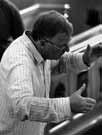
Richard Neville-Towle was educated at Durham University and the Guildhall School of Music and Drama, preceded by spells as organ scholar at Ely Cathedral and the Royal School of Church Music.
He founded Ludus Baroque to fulfil his passion for the performance of baroque masterpieces on period instruments, and continues to relish the pleasure in playing this wonderful music with performers of the quality and sense of fun that Ludus is fortunate to attract.
In addition to directing Ludus Baroque projects, Richard is Director of Music at Canongate Kirk and conductor of Edinburgh’s Really Terrible Orchestra, a celebrated community orchestra which encourages participation regardless of musical ability.
Oliver Webber Orchestral leader
Oliver Webber was born in 1969; his studies took him to Cambridge, London, Wells and The Hague, and he was taught by Mark Knight, Micaela Comberti and Tyo Terakado. In The Hague he was fortunate to meet many of the finest early music pioneers on many instruments, including the Kuijken family and members of Concerto Palatino, who had a great influence on his style and approach.
Since returning to the UK in 1995, he has established a reputation as one of the leading interpreters of ‘early’ music, from Renaissance improvisation to Romantic string quartets. He is leader of Ludus Baroque, director of the Monteverdi String Band, specialising in the performance of early seventeenth-century Italian repertoire, and is leader of the Greenwich Baroque Orchestra and Charivari Agréable Simfonie (Oxford). He is also a principal and guest leader with the Gabrieli Players, the London Handel Orchestra and the Hanover Band.
Will Dawes Chorus leader
Will Dawes received his initial musical training as a chorister at St George's Chapel, Windsor Castle. Following a scholarship to Wellington College, he became a Choral Scholar at St Mary's Episcopal Cathedral, Edinburgh. Whilst at the University of Edinburgh, he was Leader and Assistant Conductor of the Symphony Orchestra, and was awarded the Keasbey Prize for outstanding service to the musical life of the university and city.
Will is a graduate of the Royal Academy of Music where he studied choral direction and voice with Patrick Russill and David Lowe, and was awarded the Thomas Armstrong Prize for Choral Direction.
He now directs the Damon Singers, Edinburgh Camerata, Henley Choral Society, the Cappella Singers of Upminster, the newly-formed chamber choir Capricorn, and is Chorusmaster for Opera UK.
As a singer, Will has appeared as a soloist with the Scottish Chamber Choir, Edinburgh Symphony Baroque and the National Youth Choir of Great Britain.
Sophie Bevan Soprano

Sophie Bevan graduated recently from the Benjamin Britten International Opera School, where she studied with Lillian Watson as a Countess of Munster Trust award holder, Karaviotis Scholar and MBF award holder.
Sophie sings a wide range of concert repertoire and has worked with conductors including Martin Andre, Howard Arman, Laurence Cummings, Ed Gardner, Simon Halsey, Sir Neville Marriner, Paul McCreesh and Sir Charles Mackerras.
Already highly accomplished on the operatic stage, her recent engagements include her first Barbarina and Susanna (Marriage of Figaro ) for Garsington Opera and Welsh National Opera; and Xenia (Boris Godunov ), Despina (Cosi fan Tutte ), Soprano soloist (Messiah ) and Polissena (Radamisto ) for English National Opera.

Ed Lyon was educated at St John’s College, Cambridge and the Royal Academy of Music. He was a finalist in the 2003 Kathleen Ferrier Competition, and a Samling Foundation Scholar in 2004.
In 2004/5 he continued his studies at the National Opera Studio in London.
He made his professional debut at Snape Maltings as the Evangelist in Telemann’s St Matthew Passion, since when he has enjoyed a busy concert career in the UK and throughout Europe, working with conductors including Ivor Bolton, William Christie, Sir Colin Davis, David Hill, Sir Roger Norrington and Philip Pickett. Recent concerts have included Berlioz’s L’Enfance du Christ with Ivor Bolton in Salzburg (now released on Oehms Classics OC917), the title role in a concert performance of Stravinsky’s The Rake’s Progress with the City of Birmingham Symphony Orchestra, extracts from Rameau’s Les Indes Galantes with William Christie and Les Arts Florissants, Haydn’s Creation with the Bach Choir and the RTE National Symphony Orchestra in Dublin and the title role in Haydn’s Orfeo in Moscow and Novosibirsk.
William Berger Bass

William Berger is described by Gramophone Magazine as ‘one of the best of our younger baritones’. He is an Associate and graduate of the Royal Academy of Music and has been a member of the Young Singers Programme at English National Opera. He made his operatic debut performances in Göttingen in 2001 as Ormonte in Partenope, Zebul in Jeptha and Mercurio in Atalanta (all Handel). He has sung in operatic productions at the Festival Lyrique d’Aix-en-Provence, the Handel & Haydn Society (Boston) and the Mark Morris Dance Company. His Mozart roles have included Guglielmo in Cosi fan Tutte, Don Giovanni, Papageno in Die Zauberflöte, Count Almaviva in Le Nozze di Figaro and Harasta in Janáˇcek’s The Cunning Little Vixen
William performed in Bach’s Christmas Oratorio and Handel’s Alexander’s Feast with Ludus Baroque in 2009; other works in his repertoire include Handel’s Apollo e Dafne, Orff’s Carmina Burana and Faure’s Requiem. He took part in the world premiere of Michael Stimpson’s The Angry Garden. William has given song recitals at Wigmore Hall and Oxford Lieder Festival and appears on a number of CD recordings.
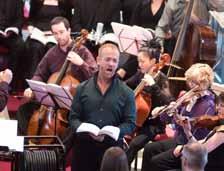
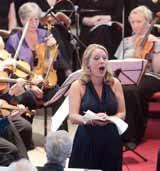
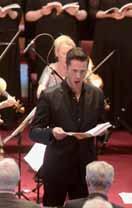
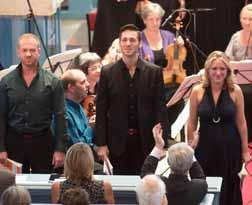

William Turner (1651-1740): Sacred Choral Music
Choir of Gonville & Caius College, Cambridge, Yorkshire Baroque Soloists, Geoffrey Webber conductor DCD34028
The restoration of the monarchy in 1660 ushered in one of the finest periods of English music, though the recovery of church music was slow and difficult. Turner, in 1660 a precocious nine-year-old, went on to become one of the best-known composers and singers of his day. This disc presents a cross-section of his sacred music (including several premiere recordings), ranging from small-scale liturgical works to one of his grandest creations, the Te Deum and Jubilate in D.
‘invigorating and highly persuasive ... a reminder of the still unknown riches of English Baroque music’ — Gramophone, October 2007

O Virgo Benedicta: Music of Marian Devotion from Spain's Century of Gold
The Marian Consort, Gwendolen Martin & Emma Walshe sopranos , Rory McCleery countertenor/director, Nicholas Scott tenor, Steffan Jones baritone, Christopher Borrett bass DCD34086

Concerto Caledonia Late Night Sessions:
Live at the Edinburgh International Festival
Concerto Caledonia, David McGuinness conductor, with guests Martin Carthy, Michael Marra, Alasdair Roberts, Katharine Fuge
DCD34093
Four concerts at the 2009 Edinburgh International Festival offered us a great opportunity to draw on our repertoire of the last 17 years – a collection of Scottish music through the centuries – and to invite a few special guests to add some new discoveries along the way. It’s guaranteed live, and all the better for it!
‘Be prepared to be surprised by the reams of insights, wicked and witty, humorous and heartbreaking, exhilarating and energetic on offer from McGuinness and his leftfield outfit’ — The Herald, August 2008
For their debut recording, the six-strong Marian Consort explores music from late sixteenth and early seventeenth-century Spain. These luminary works demand performances of great intelligence and vocal commitment. The youthful Marians bring hushed intimacy and bristling excitement to some of the most gorgeously searing lines in the history of European polyphony.
‘Singing with a rich yet lucid tone and extraordinary blend ... huge contrast in emotion, from gentle and tender to heated and impassioned.‘ — The Herald

John Kitchen plays Handel Overtures
John Kitchen
DCD34053
Handel’s overtures had an independent life almost from their inception, and the practice of performing them on keyboard instruments has a similarly long pedigree. Keyboard specialist John Kitchen virtuosically evokes Handel’s orchestral palette with Jacob Kirckman’s 1755 harpsichord, a classic instrument from the very apex of the English harpsichord-building tradition.
‘As a champion of the instruments in the Raymond Russell Collection in Edinburgh, John Kitchen‘s previous recordings have drawn universal praise. This latest addition to his discography is destined, I am sure, to enhance his formidable reputation.’
— Early Music Review, August 2009
